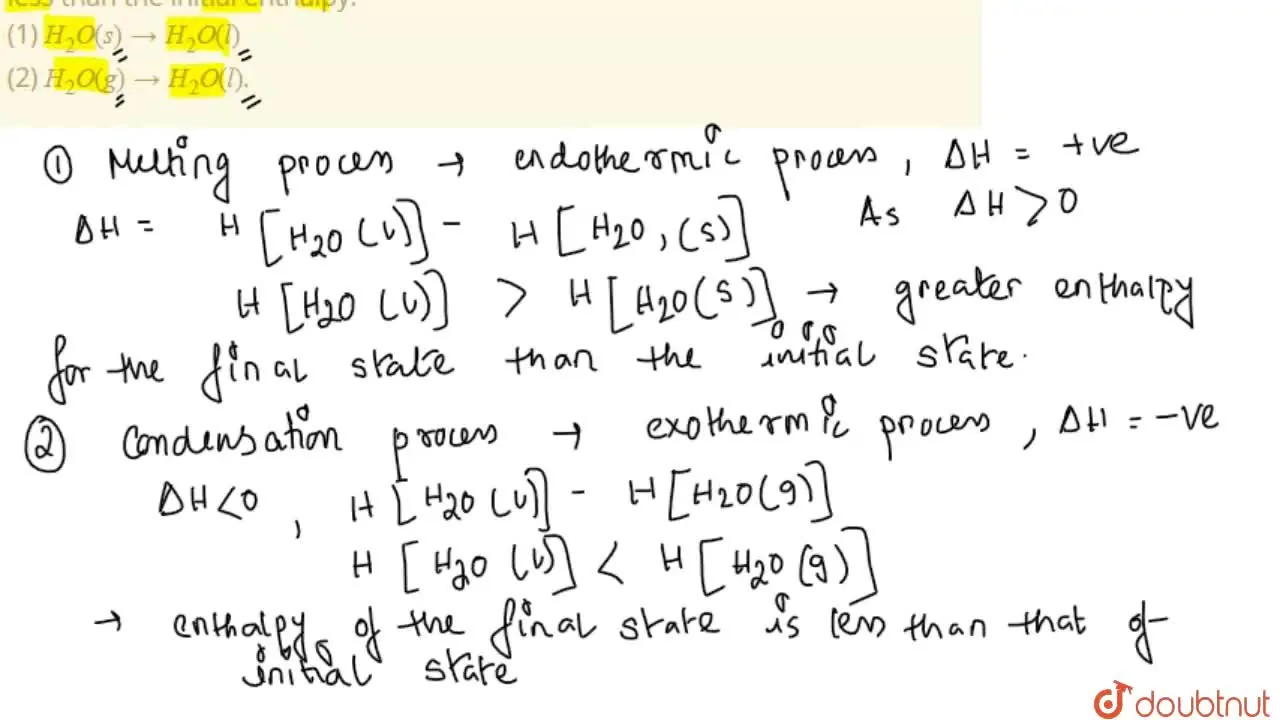For each of the given changes, state whether the final enthalpy is greater or less than the initial enthalpy:
(1) H2O(s)→H2O(l)
(2) H2O(g)→H2O(l).Solution in Bengali
Change (1) is a melting process. So, it is an endothermic process. Hence, in this process, ΔH=+ve.
ΔH=H[H2O(l)]−H[H2O(s)]. As ΔH>0,H[H2O(l)]>H[H2O(s)], indicating greater enthalpy for the final state than the initial state.
Change (2) is a condensation process and so, it is an exothermic process. hence in this process ΔH=−ve.
ΔH=H[H2O(l)]−H[H2O(g)]
Since ΔH<0,H[H2O(l)]<H[H2O(g)]. thus enthalpy of the final stae is less than that of the initial state.
Related Playlists
- BOOK - CHHAYA PUBLICATIONCHAPTER - CHEMICAL THERMODYNAMICSEXERCISE - ENTRANCE QUESTION BANK53videos
CHEMICAL THERMODYNAMICS
- BOOK - CHHAYA PUBLICATIONCHAPTER - CHEMICAL THERMODYNAMICSEXERCISE - MCQ HOTSPOT (SINGLE CORRENT TYPE)71videos
CHEMICAL THERMODYNAMICS
- BOOK - CHHAYA PUBLICATIONCHAPTER - CHEMICAL THERMODYNAMICSEXERCISE - SOLVED NCERT EXERCISE22videos
CHEMICAL THERMODYNAMICS
- BOOK - CHHAYA PUBLICATIONCHAPTER - CHEMICAL KINETICSEXERCISE - EXERCISE (NUMERICAL PROBLEMS)37videos
CHEMICAL KINETICS
- BOOK - CHHAYA PUBLICATIONCHAPTER - CHEMISTRY IN EVERYDAY LIFE EXERCISE - PRACTICE SET 1515videos
CHEMISTRY IN EVERYDAY LIFE
Similar Questions
Which of the following statement is true-
05:40View SolutionThe equation of state for 'n' mol of an ideal gas is PV=nRT. In this equation, the respective number of intensive and extensive properties are-
04:20View SolutionA thermodynamics state function is a quantity-
02:26View Solution2A→4B+D , in this reaction, concentration of B increases to 2×10−3mol.L−1 after 10s from the start of the reaction . Calculate : rate of formation of B
02:50View SolutionWhich will not enhance nutritional value of food-
02:25View SolutionAssertion (A): The enthalpy of formation of H_(2)O(l) is greater than that of H_(2)O(g) . Reason (R ) : Enthalpy change is negative for the condensation reaction H_(2)O(g) rarr H_(2)O(l) .
04:05View SolutionFor the process, H2O(l)→H2O(g)
03:42View SolutionC2H6(g)+72O2(g)→2CO2(g)+3H2O(g)
ΔH∘=−1427.7KJ
If the enthalpy of vaporization for H2O(l)is 44.0 KJ.mol, what is ΔH∘ for this reaction if H2O(l) is formed insteat of H2O(g)?02:50View SolutionStatement-1: The enthalpy of formation of H_(2)O(l)is greater than of H_(2)O(g) in magnitude. Statement -2: Enthalpy chnge Is negative for the condensation reaction H_(2)O(g)toH_(2)O(l)
02:19View SolutionH_(2)O(l)toH_(2)O(g) , DeltaH=+43.7 kJ H_(2)O(s)toH_(2)O(l) , DeltaH=+6.05kJ The value of DeltaH_((sublimation)) of ice is
View SolutionThe enthalpy of the reaction : H_(2)O_(2)(l)toH_(2)O(l)+(1)/(2)O_(2)(g) is -23.5 kcal mol^(-1) and the enthalpy of formation of H_(2)O(l) is -68.3 kcal mol^(-1) . The enthalpy of formation of H_(2)O_(2)(l) is
04:26View SolutionThe enthalpy change at 298 K of the reaction H_(2)O_(2)(l)toH_(2)O(l)+1//2O_(2)(g) is -23.5 kcal mol^(-1) and enthalpy of formation of H_(2)O_(2)(l) is -44.8 kcal mol^(-1) . The enthalpy of formation of H_(2)O(l) is
02:31View SolutionStatement 1 : The enthalpy of formation of H_(2)O(l) is greater than that of H_(2)O(g) in magnitude. Statement 2 : Enthalpy change is negative for the condensation reaction. H_(2)O(g) rarr H_(2)O(l)
03:56View SolutionThe enthalpy of combustionof 1 mole of H_(2) to form H_(2)O(l) is "…........." kJ whereas to form H_(2)O(g), it is "…....................." kJ.
View SolutionThe standard enthalpy formation of H_(2)O(l) is -68.0 kcal , the heat of formation of H_(2)O(g) is likely to be
03:06View Solution


